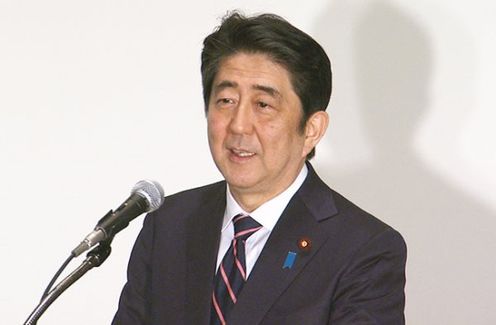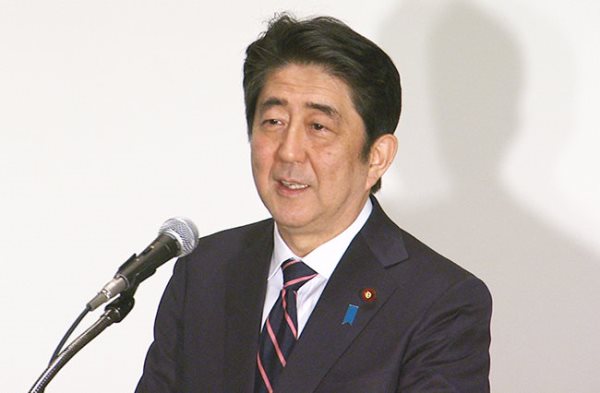Home > News > The Prime Minister in Action > February 2016 > Executive Women Symposium Reception
The Prime Minister in Action
Executive Women Symposium Reception
February 17, 2016
[Provisional Translation]
Prime Minister Shinzo Abe attended the Executive Women Symposium Reception held in Tokyo.
The Prime Minister said in his address,
“Good evening. My name is Shinzo Abe. I would like to express my sincere thanks for being invited to this event, where you are all directly tackling the urgent issue facing Japan, “Japanese corporations transformed by women executives.”
I will create opportunities whereby, if they have the drive, anyone can actively be engaged in the betterment of the world and society. This will lead to a Japan with great vitality and dynamism. Since the inauguration of the second Abe Cabinet, we have consistently followed these ideas. I firmly believe that the dynamic engagement of all citizens that values each and every person is the ultimate growth strategy.
Active participation by women lies at the core of this, and continues to be the greatest challenge. Abemomics is womenomics. Creating a society in which all women shine is essential for growth.
Through the active participation of women, the countries of Northern Europe have successfully achieved both economic growth and rising birth rates. The biggest barrier facing Japan in order to follow in these countries’ footsteps is its male-centered working culture premised on long working hours. Nagatacho and Kasumigaseki, where I am based, are truly examples of this.
We will spread a corporate culture where working efficiently within a limited time is valued, and where husbands also actively take childcare leave, and both partners in a couple share the housework and child-rearing. We will make this the norm for Japan.
Through a reform in our mindset, including that of men, we will review the prevailing styles of work and careers. By doing so, in addition to increasing the number of women executives, we will create an environment where both highly productive work and fulfilling lives can comfortably coexist. These kinds of measures are needed in Japanese companies.
The government itself will also act. For example, work-life balance will be added as an item for evaluation in government procurement. We will add steady momentum to corporate measures.
Unless we change our work styles, there will not be an increase in the number of women in leadership positions. At the same time, unless such women increase, true reforms will not take place.
First, in an effort to ‘practice what you preach,' in regard to public employees, we decided on a policy in which the ratio of women newly employed by the entire government would be 30% or higher from this fiscal year. In regard to the group of main career track employees who are candidates for becoming leaders in the future, we achieved this goal and increased the rate to 34.3%, a large 10.4% increase from the previous fiscal year realized in one fell sweep. Also, in regard to public employees with “designated posts,” which is the equivalent of an executive position in a company, the ratio has almost doubled over the last three years.
The diversification of human resources yields innovation. Japanese companies are becoming aware of this. By having diverse human resources and utilizing their various strengths and wisdom, new goods and services can be introduced to the market. This is backed up by the results of a study that found that companies with female directors are more highly evaluated on the stock market than those without.
However, there are still companies that have not yet taken the first step. Thus, I have been saying to managers of publicly listed companies that I would like to see the appointment of at least one female executive among the management team at each company. At the same time, we have made it a requirement to list the percentage of female officers in securities reports. Moreover, we have made it a requirement for companies to formulate a voluntary action plan that includes numeric targets related to the enhancement of the employment and promotion of women from April, and to publicly release this information. Both the government and municipalities will also make action plans. This will be the first step to having women in positions where they have decision-making authority.
We will increase the number of women in leadership positions. Those women will build an environment that will make it easy to develop many more women in leadership positions in the future. Through a positive cycle of women’s promotions and reform of work styles, we will change the approach of companies, the government, and society as a whole. I would hope that all of you women who are participating in today's Symposium stand in the front lines of that endeavor. Both Ms. Masako Mori of the Liberal Democratic Party, the former Minister in charge of Support for Women's Empowerment, and Ms. Tomomi Inada, Chair of the Policy Research Council of the Liberal Democratic Party, are kindly attending today's event. They have both worked as Cabinet members in the second Abe administration, and achieved outstanding results in their work. I would like both of them to continue to do their best so they will be future leaders of the LDP, or candidates for the position of Prime Minister.
I will convey my wish for women to participate more actively, not only in Japan but also internationally. With the G7 Ise-Shima Summit approaching in May, I will use the opportunity of not only the Summit Meetings, but also all the related ministerial meetings, to discuss issues toward promoting active participation by women.
We will advance the international momentum on advancing discussion in all fields on what should be done so that women can participate more actively – in other words, 'mainstreaming.'
I heard that at today's Symposium, leaders and researchers who are active in the global frontlines identified issues in regard to the power of women to change both leadership and companies.
I strongly hope that all of the participants here today will be newly appointed as executives at the corporate shareholders' meetings this summer, or be promoted within your organizations. I would like to close my remarks by saying that your activities will energize Japan as a whole. I hope that this will provide Japan with strong growth, and the whole world will become more aware of the importance of women's abilities. Thank you very much.


